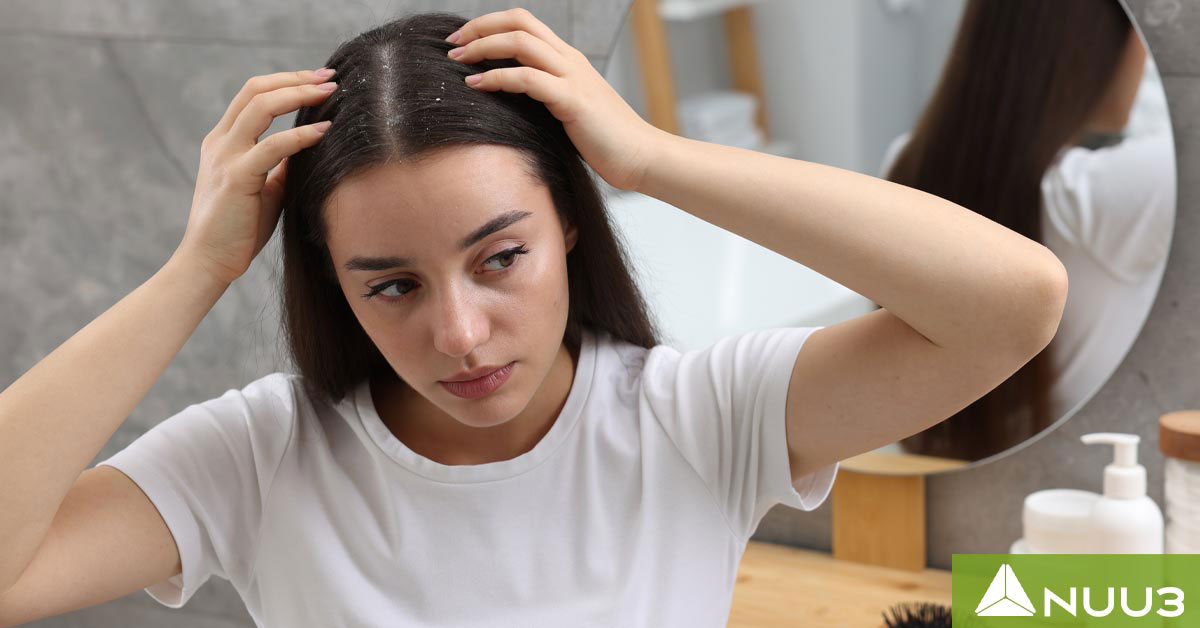Introduction
Scalp eczema is a common skin condition that affects the scalp, causing inflammation, itching, redness, and flakiness. It can be uncomfortable and, if left untreated, may lead to more serious complications such as infections or hair loss. Scalp eczema can take different forms, such as seborrheic dermatitis or atopic dermatitis, and understanding the root cause is key to managing flare-ups effectively. Since it shares symptoms with other scalp conditions like dandruff or psoriasis, proper diagnosis and treatment are essential for relief. In this guide, we’ll explore the causes, symptoms, and treatment options for managing scalp eczema and preventing flare-ups.
What Is Scalp Eczema?
Scalp eczema is a skin condition that causes inflammation, redness, itching, and flaky patches on the scalp. It can range from mild irritation to more severe symptoms like the formation of scabs on the scalp due to persistent scratching. Unlike other scalp conditions like dandruff or psoriasis, scalp eczema tends to involve more intense inflammation and discomfort. Dandruff usually causes flaky, white scales but lacks the redness and irritation associated with eczema, while psoriasis often presents with thicker, silvery scales that extend beyond the scalp.
Scalp eczema appears in different forms, with the most common types being:
-
Atopic Dermatitis:A chronic condition that causes dry, itchy patches on the scalp, often seen in individuals with a history of allergies or asthma.
-
Seborrheic Dermatitis:This type presents as greasy, yellowish flakes and is most commonly associated with an overproduction of oil and yeast on the scalp.
While these types share some similarities with other skin conditions, scalp eczema generally requires specific treatments to manage its symptoms and prevent further irritationor complications.
Causes of Scalp Eczema
Scalp eczema can be triggered by a variety of factors that lead to an itchy scalp with no dandruff or visible flaking, making it different from common conditions like dandruff. Some of the key causes include:
-
Genetic Factors: A family history of eczema or related conditions like asthma or allergies can increase the likelihood of developing scalp eczema. Individuals with sensitive skin are often more prone to this condition.
-
Environmental Triggers: External factors such as cold weather, humidity, pollution, or exposure to harsh chemicals in hair products can irritate the scalp, leading to eczema flare-ups.
-
Skin Sensitivity: People with sensitive skin may react negatively to certain hair care products, such as shampoos with strong fragrances, sulfates, or alcohol, causing inflammation and an itchy scalp with no dandruff.
-
Hormonal Changes: Fluctuations in hormone levels, especially during pregnancy, menopause, or adolescence, can contribute to scalp eczema.
-
Stress: High levels of stress can weaken the immune system, leading to a worsening of eczema symptoms, such as scalp irritation and flare-ups. Managing stress is crucial for preventing these flare-ups, and incorporating relaxation techniques or stress-reducing products like NUU3 Keep Calm Gummies can be helpful. These gummies are designed to support stress relief, potentially helping to reduce eczema-related irritation and keep the scalp calm and balanced.
-
Overproduction of Sebum: In cases of seborrheic dermatitis, the scalp produces excess oil, which combines with yeast on the skin and causes inflammation and irritation, often without visible dandruff.
These factors contribute to scalp eczema, which can cause significant discomfort and require targeted treatments to soothe the scalp and prevent future flare-ups.
Symptoms of Scalp Eczema
Scalp eczema presents a range of symptoms that can vary in severity, but it generally causes significant discomfort. Common symptoms include:
-
Red, Inflamed Patches:The scalp may develop red, swollen areas that are often itchy and tender.
-
Itching: Intense itching is one of the most noticeable symptoms, often leading to excessive scratching, which can worsen the condition.
-
Flaking or Scaling:The skin on the scalp may peel or flake off, producing white or yellowish scales, similar to dandruff but typically more severe.
-
Scabs or Crusting:Continuous scratching or irritation can lead to open sores or scabs on the scalp.
-
Dryness:The scalp may feel dry and tight, exacerbating the itching and discomfort.
-
Hair Thinning or Loss: Persistent scratching and inflammation can lead to hair thinning or loss in affected areas. This is why it's important to focus on maintaining scalp health with nutrients like collagen for hair growth, which helps strengthen hair follicles and improve scalp conditions.
These symptoms can range from mild to severe, but if left untreated, they can lead to complications such as infections or more pronounced hair loss. Addressing the symptoms early can help maintain scalp and hair health.
How to Identify Scalp Eczema vs Other Scalp Conditions
Scalp eczema shares symptoms with other scalp conditions, making it important to differentiate between them for proper treatment. Here's how to identify scalp eczema versus other common issues:
Scalp Eczema
-
Inflammation and Redness: Scalp eczema causes red, inflamed patches that may be itchy and tender. Unlike dandruff, which is mostly limited to flaking, scalp eczema involves significant irritation and redness.
-
Intense Itching: Itching is a hallmark symptom of scalp eczema. This can lead to scratching, which can result in sores or scabs on the scalp.
-
Flaking or Scaling: Flakes from scalp eczema can be white or yellowish, similar to dandruff, but are often accompanied by dryness or greasy patches.
-
Hair Thinning: Persistent inflammation and scratching can cause hair thinning or loss in severe cases.
Dandruff (Seborrheic Dermatitis)
-
Milder Itching: While dandruff can cause itching, it’s usually less intense than eczema.
-
Flakes Without Redness: Dandruff causes white, oily flakes that shed from the scalp, but it generally does not cause inflammation or redness.
-
Greasy Appearance: Dandruff can create greasy-looking patches on the scalp due to the overproduction of sebum, but it lacks the irritated, inflamed patches of eczema.
Psoriasis
-
Thick, Silvery Scales: Psoriasis often causes much thicker scales than eczema, with a silvery-white appearance.
-
Well-Defined Patches: Psoriasis plaques are typically more defined than eczema patches, and the condition can extend beyond the scalp to areas like the neck or behind the ears.
-
Less Hair Loss: Hair loss is less common with psoriasis, as the inflammation tends to be more localized on the skin.
Diagnosis of Scalp Eczema
Diagnosing scalp eczema typically involves a combination of a physical examination, medical history, and, in some cases, additional tests to rule out other conditions. Here's how the diagnosis process generally works:
-
Physical Examination: A dermatologist will begin by closely examining the scalp to identify the characteristic signs of eczema, such as red, inflamed patches, flaking, and possibly scabs on the scalp from excessive scratching. They will also look for signs of dryness or greasy patches, which can help distinguish eczema from other conditions like dandruff or psoriasis.
-
Medical History: The doctor will ask about your medical history, including any family history of eczema, allergies, asthma, or other skin conditions. They will also inquire about any triggers, such as changes in hair care products, environmental factors, stress levels, or recent illnesses that may have contributed to the flare-up.
-
Patch Testing: If an allergic reaction is suspected to be causing the scalp eczema, the dermatologist may recommend a patch test. This involves applying small amounts of allergens to the skin to determine whether an allergic reaction occurs, helping to pinpoint specific irritants that might be triggering the condition.
-
Skin Scraping/Biopsy: In some cases, the doctor may take a small sample of skin (a biopsy) or a skin scraping to rule out other conditions, such as fungal infections or psoriasis. These samples are analyzed under a microscope to confirm the presence of scalp eczema and exclude other possible scalp disorders.
-
Exclusion of Other Conditions: Scalp eczema shares symptoms with conditions like psoriasis, dandruff, and fungal infections, so the diagnosis process often involves excluding these. The doctor will look for differences such as thicker scales in psoriasis or greasy flakes in dandruff to make an accurate diagnosis.
Treatment Options for Scalp Eczema
Lifestyle Adjustments
-
Managing Stress: Since stress can trigger eczema flare-ups, incorporating stress management techniques like meditation, yoga, or using stress-relief products can help prevent exacerbations.
-
Avoiding Irritants: Reducing exposure to harsh hair products that contain fragrances, sulfates, or alcohol can prevent scalp irritation. Opt for mild, hypoallergenic shampoos and conditioners designed for sensitive skin.
Moisturizing the Scalp
-
Regularly moisturizing the scalp with natural oils like coconut oil or jojoba oil can help alleviate dryness and reduce flaking. These oils also have anti-inflammatory properties, which can soothe irritated skin.
Natural/Home Remedies
-
Aloe Vera: Known for its soothing properties, aloe vera can help reduce itching and inflammation when applied to the scalp.
-
Tea Tree Oil: This natural antifungal and antibacterial oil can help reduce scalp irritation and flaking when diluted and used properly.
Over-the-Counter Remedies
-
Anti-Inflammatory Shampoos: Products containing ingredients like salicylic acid or coal tar can be effective in reducing flakiness and inflammation, particularly in mild cases of scalp eczema. These shampoos help soothe the scalp and alleviate irritation.
-
Antihistamines: Oral antihistamines may help reduce itching, especially during eczema flare-ups triggered by allergies. By calming the immune response, antihistamines can provide relief from the persistent itching that comes with scalp eczema.
Additionally, incorporating products like NUU3 Hair, Skin, and Nails Gummies into your routine can support overall hair and scalp health. These gummies contain vital nutrients such as biotin and collagen, which promote healthier hair growth and may help strengthen the scalp's resilience against irritation and inflammation.
Phototherapy
-
In more severe or persistent cases, light therapy (also known as phototherapy) may be used to reduce inflammation and calm the skin. This treatment involves exposing the scalp to controlled doses of UV light.
Treating Underlying Conditions
-
If scalp eczema is triggered or worsened by conditions like allergies, hormonal imbalances, or immune system disorders, treating these underlying causes can help control eczema and prevent flare-ups.
By combining medical treatments with appropriate lifestyle changes and gentle scalp care, individuals with scalp eczema can manage their symptoms more effectively and reduce the frequency of flare-ups. Always consult a dermatologist for a treatment plan tailored to your specific needs.
Preventing Scalp Eczema Flare-Ups
Preventing scalp eczema flare-ups involves taking proactive steps to manage triggers, maintain a healthy scalp, and reduce inflammation. Here are some key strategies:
Scalp Care Routine
-
Use gentle, sulfate-free shampoos designed for sensitive skin to avoid further irritation. Avoid hair products with harsh chemicals, fragrances, or alcohol, which can aggravate the scalp.
-
Regularly moisturizing the scalp with natural oils like coconut oil or using specialized treatments can help keep the scalp hydrated and reduce the risk of flare-ups.
Avoiding Irritants
-
Limit exposure to known irritants that can trigger scalp eczema. This includes avoiding harsh weather conditions, using unscented and hypoallergenic hair care products, and steering clear of tight hats or hairstyles that can cause friction and irritation.
Managing Stress
-
Stress is a common trigger for scalp eczema flare-ups. Incorporating stress management techniques such as mindfulness, meditation, and yoga, or using stress-relief supplements like NUU3 Keep Calm Gummies can help maintain overall well-being and reduce eczema-related symptoms.
Environmental Adjustments
-
Maintaining proper humidity levels in your living space can prevent your scalp from drying out, especially during colder months when indoor heating can exacerbate eczema. Consider using a humidifier to keep the air moist.
Regular Medical Check-Ups
-
Stay on top of any underlying health conditions that could trigger scalp eczema. Regular medical check-ups can help address issues like allergies, hormonal imbalances, or autoimmune disorders, which can contribute to eczema flare-ups.
Healthy Diet and Nutrients
Eating a balanced diet rich in essential vitamins and minerals is vital for maintaining overall skin and scalp health. Incorporating nutrient-dense foods, along with supplements like NUU3 Nature's Superfuel can provide a powerful boost of energy and nutrients that support your body’s needs. Additionally, supplements such as NUU3 Hair, Skin, and Nails Gummies, which are packed with biotin and collagen, help promote healthy hair growth and fortify the scalp. These nutrients make the scalp more resistant to irritation and inflammation, helping to reduce the likelihood of scalp eczema flare-ups. Together, these products work to maintain a healthy balance for both your scalp and hair.
Complications of Untreated Scalp Eczema
If scalp eczema is left untreated, it can lead to several complications, some of which may significantly impact scalp health and hair growth. Here are the key complications:
-
Infections: Persistent scratching due to intense itching can cause breaks in the skin, leading to bacterial or fungal infections. These infections may worsen scalp inflammation and make treatment more challenging.
-
Hair Loss: Ongoing irritation and scratching can damage hair follicles, leading to hair thinning or even permanent hair loss in affected areas. Scarring from severe scratching can also prevent hair regrowth.
-
Chronic Inflammation: Without proper treatment, scalp eczema can result in long-term inflammation, which weakens the scalp’s protective barrier. This can make the skin more vulnerable to external irritants, exacerbating the condition.
-
Spread to Other Areas: Eczema can spread to other parts of the body, including the face, neck, or ears, making it a more widespread skin issue that requires broader treatment.
-
Scarring: Severe or prolonged scratching can cause scabs on the scalp and scarring, which may lead to permanent skin damage and create long-term discomfort or aesthetic concerns.
FAQs Section
How often should I wash my hair with scalp eczema?
Wash 2-3 times per week with a gentle, sulfate-free shampoo to avoid further irritation.
Can diet affect scalp eczema?
Yes, a balanced diet rich in nutrients can improve scalp health and help manage eczema. Supplements like NUU3 Nature's Superfuel can provide additional support.
Is scalp eczema contagious?
No, scalp eczema is not contagious.
Will my hair grow back after eczema treatment?
Yes, hair often grows back after effective eczema treatment, especially once the inflammation and itching are controlled.
Conclusion
Scalp eczema is a manageable condition, but timely treatment and proper care are essential to prevent complications like infections, hair loss, and chronic inflammation. By adopting a gentle hair care routine, managing stress, and maintaining a nutrient-rich diet, you can support scalp health and reduce flare-ups. With the right approach, symptoms can be controlled, and hair regrowth is often possible, allowing you to maintain a healthy scalp and hair in the long run. Always consult a dermatologist to tailor the best treatment plan for your needs.










